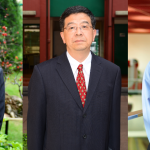 MPI “Basic Law Online Lecture” was taught by (left to right) : Associate Professor Li Yanping, Professor Xu Chang and Lecturer Che Sei Tak.
MPI “Basic Law Online Lecture” was taught by (left to right) : Associate Professor Li Yanping, Professor Xu Chang and Lecturer Che Sei Tak.
The “Basic Law Online Lecture” launched by the Macao Polytechnic Institute on May 12, 14, 19 and 21 has been successfully held. This online lecture was lectured by Professor Xu Chang, Associate Professor Li Yanping, and Lecturer Che Sei Tak of the “One Country, Two Systems” Research Centre of the MPI. The lecture aims to let Macao residents, college teachers and students to get better understanding of the Macao Basic Law.
In “The Characteristics, Practice and Enlightenment of Macao Basic Law”, Xu Chang mainly described the origin of “one country, two systems” policy, the connotation of the special administrative region system, and analyzed the characteristics of the Macao Basic Law by comparing Hong Kong Basic Law and Macao Basic Law. Judging from the content of the Basic Law, it can be seen that the Macao Basic Law is in line with the characteristics and actual needs of Macao society; combined with the practice of the Basic Law, it can be seen that the Macao Basic Law is not only a living norm for continuous development and innovation, but also a security and motivation of the prosperity of Macao. In “Pandemic Prevention is Also a Defense of National Security”, Xu Chang introduced the rich connotation of the national security concept. Through the example of the COVID-19 pandemic, he showed that in order to maintain national security in modern society, people should not only and prohibited crimes at political level, including the seven crimes that endanger national security and are prohibited in the National Security Law. We need to eliminate all threats against national security and public security. In social life, the spread of virus not only threatens our lives, and directly jeopardizes biosecurity, economic, social, public and even national security. Therefore, government at all levels should take a holistic view of national security and take the initiative to assume the main responsibility according to law.
In “The Covid-19 Pandemic, Social Public Life and the Basic Law”, Li Yanping introduced the basic rights and freedom of Macao residents under the Macao Basic Law and the related cultural and social rules. With regard to the basic rights and freedom of Macao residents, she focused on how to understand the characteristics and types of rights and freedom and how to implement the rights and freedom stipulated in the Basic Law. In terms of cultural and social affairs, she focused on how to understand the connotation of the Macao SAR (government) to formulate relevant affairs on its own and how to recognize the connotation of social organizations to carry out various cultural and social affairs according to law. Finally, under the pandemic, she mentioned that one has to consider the “detailed balance” between public health and individual rights. And it is the basic responsibility of citizens to discuss the related issues of the social environment according to the law.
Che Sei Tak discussed several hot topics about the Macao economy under the pandemic in “The Focus of Macao’s Economic Development Under Covid-19 Pandemic”. First, he introduced how companies fulfill their social responsibilities and relevant views from the academic field. Second, he described the importance of job security and how the government should secure employment under a pandemic. Third, he mentioned the diversified development of Macao’s economy and how to understand the single industry. He concluded that Macao’s industry should develop horizontally and suggested which industry has the best conditions for diversified development.


